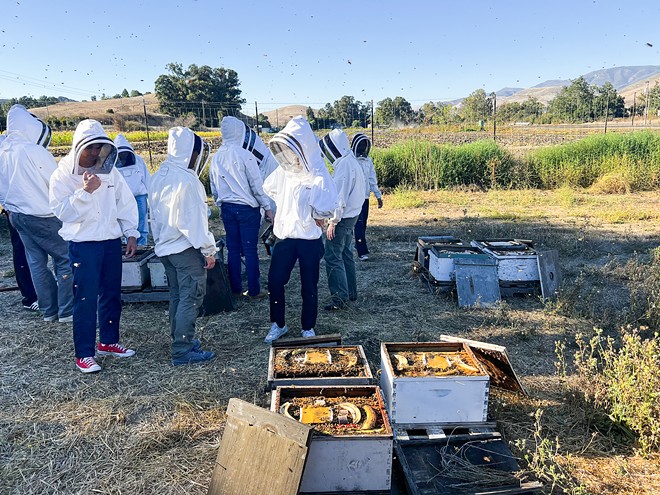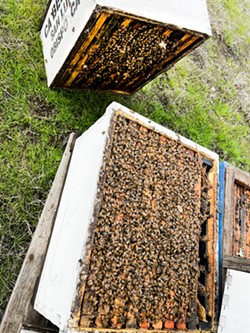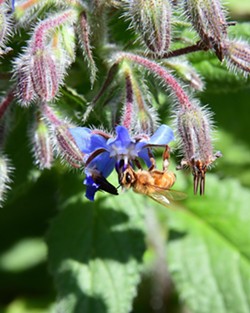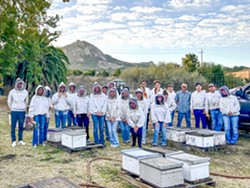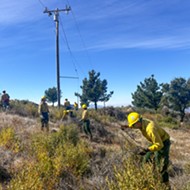[{
"name": "Newsletter Promo",
"id": "NewsletterPromo",
"class": "inlineCenter",
"insertPoint": "4",
"component": "15264767",
"requiredCountToDisplay": "0"
},{
"name": "Ad - Medium Rectangle CC01 - 300x250",
"id": "AdMediumRectangleCC01300x250",
"class": "inlineCenter",
"insertPoint": "8",
"component": "2963441",
"requiredCountToDisplay": "12"
},{
"name": "Ad - Medium Rectangle LC01 - 300x250",
"id": "AdMediumRectangleCC01300x250",
"class": "inlineCenter",
"insertPoint": "18",
"component": "2963441",
"requiredCountToDisplay": "22"
},{
"name": "Ad - Medium Rectangle LC09 - 300x250",
"id": "AdMediumRectangleLC09300x250",
"class": "inlineCenter",
"insertPoint": "28",
"component": "3252660",
"requiredCountToDisplay": "32"
}]
What's fuzzy, tiny, and one of the Central Coast's highest exporters of sweet treats?
It's the bee, of course.
The familiar pollinator with a mighty sting is as hard a worker as any other, especially when making something we use daily in our cooking, baking, and—according to Patrick Frazier—even biking.
"It's funny because most people don't realize how versatile and useful honey is when out and about in the great outdoors," he said laughing. "Honey sticks made from the bees out here turn bike riders into bee riders."
Frazier and fellow bee lover Jeremy Rose currently lead a unique program at Cal Poly San Luis Obispo that can turn beekeeping and honey from something you do for a fun class into a lifelong hobby or career.
Both Frazier and Rose are dedicated to growing an appreciation for beekeeping across the state, often encouraging people to ask questions and get involved with local programs for bees.
"We want to make the program accessible to everyone who wants to take the course and get involved with the bees," Rose said. "Part of that is having a class like this, that students can then go on and build upon outside of the classroom."
Frazier handles the academic side of things to help students understand why and how bees behave, and how to handle selling any potential goods the bees help create.
"I'm a hobbyist with a handful of bees, and my whole thing has always been showing students and people in general how to get involved in it like I have come to be," Frazier said. "The whole thing takes so much effort that outside of the students being the ones taking a class, I'd almost consider it more of a job-training experience."
Class activities include moving the bees from hive to hive, caring for the bees and ensuring they are healthy, and bottling the honey they make and shipping it out to Cal Poly markets.
Because students in the program are often new to the entire process, Frazier said that the focus is on giving them a foundation from which they can take the lessons they learn and turn them into a passion—if they like it.
"Most people that come into the program have no experience," he said. "But our goal is to change that, give them the fundamentals they need so that when the class is done, if they still want to continue, they can start their hives and harvest their honey, they can."
For Rose, the program did just that: It introduced him to the world of beekeeping and honey and helped him kick-start his business.
"I am more of a beekeeping enthusiast," Rose said with a laugh. "I started the California Bee Company in 2005 after going through the program, and I've run it ever since."
Rose said students like him were and still are encouraged to dive into the program and bring their honey home with them, often turning it into baked treats and sometimes even mead.
"Outside of honey, I don't think people realize how many unique things you can make relying on the bee as your source of income," Rose said.
The California Bee Company specializes in honey, which Rose said is no surprise, but it also offers a range of other bee-adjacent products.
"Sage honey is probably our most common honey, which is similar to the one they produce as part of the program at Cal Poly, but we also do oak honey, and even raspberry honey," Rose said. "We do lotion, chapstick, and anything related to beeswax as well."
Outside of offering these products, which Rose said they sell at farmers markets across SLO County, the company also has learning opportunities for non-university students looking to get into beekeeping.
"We do a lot of informative stuff with the company because there are so many people interested in that process and the honey," Rose said. "Most of the time it's because they also want their bee-based products, but sometimes they also like the idea of managing the hive and caring for the bees."
Currently, Rose said, his company plans to have tours of the hives and, in the future, may offer opportunities to get some hands-on experience.
"The best way to get involved right now is just to follow us on our various social media platforms because that is where we will make the announcements about the trips out to the hives," he said. "Hopefully, as the new year comes in, we can increase those if people are invested."
Getting into beekeeping on the Central Coast isn't necessarily easy, according to Frazier and Rose, who said the climate and ecosystems pose challenges for beekeeping rookies.
"The Central Coast as a whole is a unique place to experience beekeeping because of the challenges you face with the drier, colder temperatures that are great for a lot of plant life, but not for the bees," Frazier said. "There is so much competition from other flower-users that you have to account for, and it causes a lot of stress for the bees and their hives."
He tries to combat this by offering beekeeping classes during colder months—when bees are usually less active—so he can teach students how to prep for warmer weather.
"Most people have no idea how much work goes into the 'off-season' for things like this, especially when you are on the Central Coast," he said. "You have things like rain, something that humans sometimes take for granted, that brings with it so many blooming flowers for the bees."
Beekeeping has become a staple for the Cal Poly School of Agriculture. Frazier said it's sparked an appreciation and appetite for beekeeping across the state.
"I think purely from a class perspective, the funniest thing about this class is that by and large, most of the students that want to take it are not even agriculture students," Frazier said. "We have a lot of business majors, journalism majors, and other liberal arts majors who get involved with it."
Frazier is always hopeful that the program inpsires others to spread the passion and importance of beekeeping to the world around them, much like Rose did when he left the program.
"Having all of these students from different backgrounds and majors makes the honey and overall experience even more unique than it already is just being from the Central Coast," he said. "Can't really ask more for something most of us use to sweeten our tea in the morning, can you?"
Bee boostWant to support the efforts of the beekeeping program at Cal Poly? Visit cfs.calpoly.edu/profiles_beekeeping to see how you can donate money or gear to improve the program and open up the class to more students.

